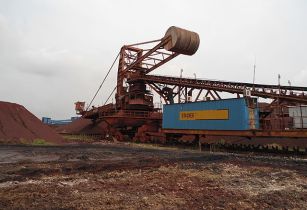Iron prices in Saudi Arabian local markets are expected to go up in the coming months following the recovery of the construction sector market, which had been hit by acute labour shortage
Authorised dealers of iron products produced by Saudi Basic Industries Corporation (SABIC), Al-Rajhi and Al-Itifaq said that the current price of iron had stabilised at US$719 per tonne.
However, the improvement in demand will push up the price, which is expected to touch US$799 per tonne that was prevalent in the market before the acute labour shortage hit the construction sector, according to a local newspaper.
Hasan Al-Zenaid, an investor in iron, said the Saudi market had witnessed a drop in demand for rebar iron due to partial suspension of activity in the construction sector following labour shortage coupled with the entry of imported iron, at the expense of national product, which was sold at US$599 per tonne. Zanaid said that eighty per cent of applications for iron products are from government projects and added that the market can absorb additional production from new iron plants, which will also create competition in prices, particularly for imported iron.
Abdullah Rudwan, head of the contractor committee at Jeddah Chamber of Commerce and Industry (JCCI), said the iron market went through a stagnant period following the correction campaign of foreign workers. By the beginning of the current year, demand for iron had gone up with projects getting back into steam.
Experts said the demand for iron had gone up by 10 per cent and the uptrend was expected to continue with government spending and housing projects picking up. With the demand for iron estimated at seven mn tonnes and national production touching five mn tonnes, there is a shortfall of two mn tonnes in the market.
It may be recalled that total production of rebar iron in the kingdom stands at 4.7 million tonnes of which SABIC's share is 2.8 mn tonnes, or 59.57 per cent, followed by Al-Itifaq at 1.3 million tonnes, Al-Rajhi and Yamamah at 500,000 tonnes for each, while Al-Mikairish and Al-Jawhara are producing 300,000 tonnes and 100,000 tonnes respectively.






